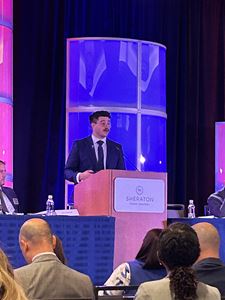When patients do not have access to prescribed medications, they are at risk of needing emergency care. Medication nonadherence is a common precipitant of acute decompensated heart failure (ADHF) requiring emergency care, with over 1 million emergency department visits and hospitalizations nationwide. Matthew Durthaler, under the mentorship of Nicholas E. Harrison, MD, researched how community density of pharmacies correlates to medication adherence among patients presenting to the emergency department for ADHF after adjusting for other social determinants of health.
Matthew recently presented this research on areas known as “pharmacy deserts” at the 2024 Society of Academic Emergency Medicine meeting in Phoenix, Arizona. The abstract and presentation, “Pharmacy Density as a Community Level Predictor of Heart Failure Medication Nonadherence: A Geospatial Analysis,” won best abstract and presentation in the medical student category.
Matthew is pursuing dual degrees at Indiana University School of Medicine and Indiana University McKinney School of Law. During the summer of 2023, he worked with Nicholas E. Harrison, MD, an assistant professor of emergency medicine and a faculty mentor for the Indiana University Medical Student Program for Research and Scholarship (IMPRS) program. The IMPRS program provides a diverse array of research and scholarly opportunities to enrich the research and experiential education of IU School of Medicine medical students. Matthew’s passion for social determinants of health, combined with Nicholas’s extensive research on heart failure, resulted in a project to understand better how pharmacy deserts affect medication nonadherence in patients with heart failure. Nicholas said, “It is to Matt’s tremendous credit that he immediately got how critical this kind of work is to emergency medicine when we first planned it out over a year ago. The future of EM needs docs like Matt who get that emergency medicine is thoroughly interconnected with every other aspect of the medical system and public health, in a way that affords us a unique opportunity to make big impacts on patients' health.”
Matthew recalled getting along with his mentor right away and being inspired throughout the summer. Nicholas’s passion for teaching statistics guided him through the statistical analyses he needed to understand the data. Matthew said he was also inspired by Nicholas’s advice to reflect on his daily work by asking, “How did I do?” and continually improve without being too critical.
Through the research, they discovered non-adherent patients accounted for 18% (n = 53) of those presenting to an emergency department for ADHF. Out of 2900 total census tracts, 370 (12.7%) were identified as pharmacy cold-spots at the 99% confidence level. After adjusting for community-level social determinants of health, living in a pharmacy cold-spot was associated with a more than 2-fold greater incidence of nonadherence related emergency department visits for ADHF.
After concluding the research, Matthew presented their findings at the 2024 Society of Academic Emergency Medicine meeting. He said the additional guidance from Nathan Alves, PhD and Paul Musey, MD were instrumental in the final poster presentation that won best abstract and presentation in the medical student category. Nathan noted, “It is always nice to mentor someone that is genuinely interested in learning and improving on something that they are already proud of. Matthew was dedicated to the iterative presentation preparation process and always came prepared to practice talks. Each time he would come back with new, more polished drafts. It is not easy to present in front of such a large audience. Matthew did an excellent job. I enjoyed watching him present on the main stage at SAEM and was excited he was selected for a presentation award.”
Identifying barriers such as pharmacy deserts are critical to preventing emergency care visits and improving the lives of patients. Their discovery sheds light on a significant healthcare gap that affects not just Indiana but many communities across the country. Medication adherence is critical for managing conditions like heart failure, where proper and consistent use of prescribed drugs can prevent complications and the need for emergency care. Matthew said the experience will make him a better physician saying he learned how crucial it is to “teach patients what their medications are doing and why they are important.” Matthew’s journey, supported by mentors like Nicholas Harrison, explores addressing disparities that can lead to better patient outcomes.
